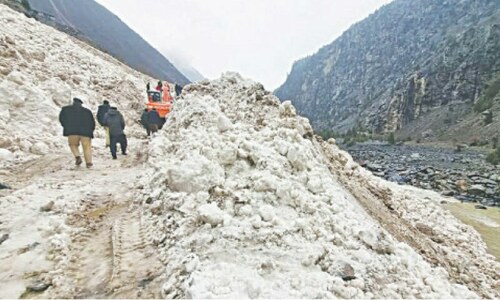
ISLAMABAD: The ruling coalition, led by the Pakistan People’s Party, consolidated its position in the Senate on Friday, taking its strength to 70 in a house of 104. And the prospect of many independents supporting it beckoned.
The PPP previously had 27 seats in the upper house of parliament, with five of them due to retire on March 11. With the success of 19 of its candidates, the PPP has become the single largest party in the Senate. Its total strength has now risen to 41, according to unofficial results.
The Pakistan Muslim League-N had seven members in the Senate and one of them is to retire. Eight of the party’s candidates won the elections, taking the number of its senators to 14.
The Awami National Party doubled its strength to 12 with the victory of seven candidates. It previously had six members in the Senate, one of whom will retire on March 11.
The Jamiat Ulema-i-Islam-F’s strength in the upper house was down to seven as seven of its senators are due to retire while the party could get only four seats on Friday.
The Muttahida Qaumi Movement, which had six senators hitherto, clinched four seats to improve its position to seven. Three of its existing senators will retire next week.
The BNP (Awami) will have four members and the PML-Functional and the National Party one each in the new Senate. Five independent candidates also won the Senate elections, taking the number of independents to 12.
The combined strength of the opposition in the house now stands at 22.
An understanding reached between the PPP, MQM and PML-F in Sindh worked as all candidates fielded by them emerged victorious.
Mian Raza Rabbani, Mukhtar Ahmad Dhamra, Dr Karim Ahmad Khawaja and Saeed Ghani of PPP, Col (retd) Tahir Hussain Mashhadi and Syed Mustafa Kamal of MQM, and Syed Muzaffar Shah of PML-F won the elections on general seats.
Abdul Ghaffar Qureshi was the only loser out of the eight candidates in the run for seven seats. Muttahida’s Nasreen Jalil and PPP’s Mudassir Sehar Kamran won the seats reserved for women. One seat reserved for minorities was clinched by Hari Ram of PPP.
Things were, however, different in Punjab where eight candidates were left in the run for seven general seats.
The electoral battle saw Mohsin Leghari of the Unification Bloc, a splinter group of the PML-Q, making his way to the Senate. It surprised many who believed that the understanding reached between the PPP and the PML-Q would work as planned.
MAN OF THE DAY: All eyes were glued to the polls in Punjab where Mohsin Leghari, an active member of the provincial assembly, was likely to stage an upset.
Leghari had to fight to remain in the race on legal front as well after his nomination papers were rejected by the returning officer on the ground that he had won a Punjab Assembly seat on a ticket awarded by the PML-Q and could not contest the Senate polls as an independent candidate.
He challenged the decision in the Election Commission and argued that under the law, a candidate for the Senate had to declare only his political affiliation; a party ticket was not necessary.
He cited the examples of two ministers from Balochistan who had won the general election on PML-Q ticket and their nomination papers for contesting the Senate elections had been accepted. His plea convinced the Election Commission and his nomination papers were finally accepted.
Many were hoping that ultimately Kamil Ali Agha, the only PML-Q candidate in the run, would be the loser if Mr Leghari won, but Muhammad Aslam Gill of PPP turned out to be the biggest victim. Sardar Zulfikar Khosa, M. Hamza, Muhammad Zafaullah Khan and Malik Rafique Rajwana of PML-N, Dr Babar Awan of the PPP and Kamil Ali Agha of the PML-Q were the winners, besides man of the day Mohsin Leghari.
In Balochistan, Sardar Fateh Muhammad Hasni, Muhammad Yousaf and Nawabzada Saifullah Magsi (PPP), Mir Israrullah Zehri (BNP-A), Saeedul Hasan Mandokhel (PML-Q), Daud Khan Achakzai (ANP) and Hafiz Hamdullah Saboor were winners of the contest for seven general seats.
Rubina Irfan of the PML-Q and Naseema Ehsan of the BNP-A won the seats reserved for women. Rozi Khan Kakar of the PPP and Mufti Abdul Sattar emerged victorious on the seats reserved for technocrats. The seat reserved for minorities went to Heman Dass of JUI-F.
In Khyber Pakhtunkhwa, Azam Hoti, Shahi Syed and Baz Muhammad Khan (ANP), Haji Saifullah Khan Bangash and Ahmad Hasan (PPP), Nisar Muhammad Khan (PML-N) and Talha Mehmood (JUI (F) won the general seats.
Farhatullah Babar (PPP) and Ilyas Bilour (ANP) won the seats for technocrats. Amar Jeet of the ANP won the seat reserved for minorities.
Mushmmad Saleh Shah, Malik Najmul Hasan, Hadayatullah and Hilalur Rahman won the four seats reserved for Fata. Munir Khan Orakzai, the parliamentary leader of Fata MNAs in the National Assembly, lost the race.














































